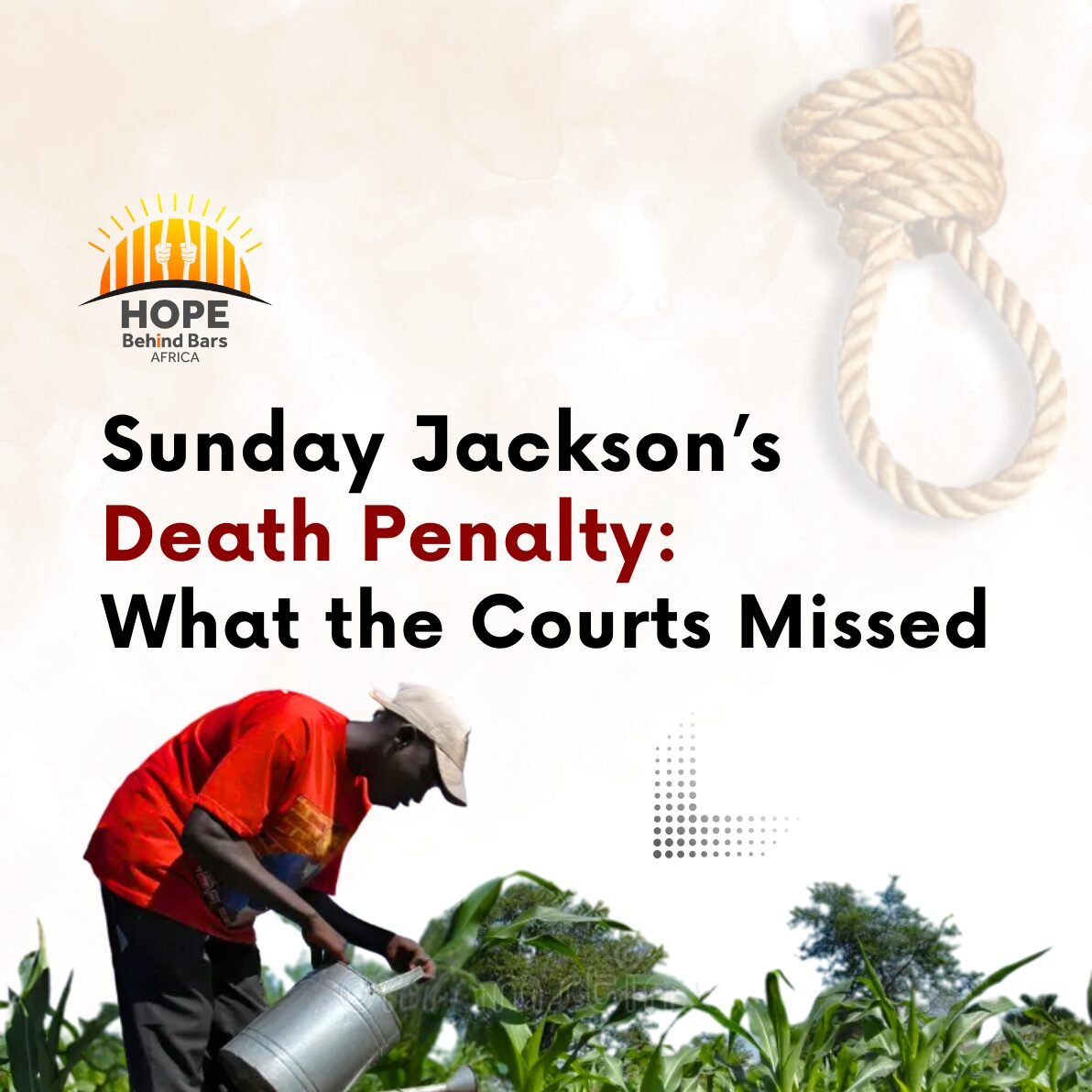- Written by: obinna
- May 5, 2025
By David Abraham
On the 7th of March 2025, the Supreme Court of Nigeria upheld the death sentence of Sunday Jackson, a farmer from Adamawa State, who was convicted for the killing of an itinerant herder, Ardo Bawuro.
It was in the course of his labour, on his own farm, that Jackson was accosted by Bawuro. Bawuro ushered his cows onto Jackson’s farm, and when Jackson chased them off, Bawuro then turned on him, wielding a knife.
Jackson was unarmed and attempted to run. However, Bawuro caught up with him and stabbed him thrice. A fight ensued, during which Jackson managed to seize the knife in the struggle. He testified that at the point when he seized the knife, he was exhausted and injured from the stabbing, and he stabbed the herder in the throat three times to escape.
Strangely, he was arrested and charged with culpable homicide punishable with death under Section 221(a) of the Penal Code Law of Adamawa State. Even more strangely, he was convicted and sentenced to death.
What Does the Law Say About Self-Defence?
The right to defend oneself is recognized in multiple sources of Nigerian law:
-
Section 33(2)(a) CFRN
- (2) A person shall not be regarded as having been deprived of his life in contravention of this section if he dies as a result of the use, to such extent and in such circumstances as are permitted by law, of such force as is reasonably necessary – (a) for the defence of any person from unlawful violence or for the defence of property:
-
Section 59 of the Penal Code
Section 59: “Nothing is an offence which is done in the lawful exercise of the right of private defense.”
-
Section 61(a) of the Penal Code — When the right extends to causing death
“The right of private defense of the body extends, under the restrictions mentioned in section 60, to the voluntary causing of death or of any other harm to the assailant, if the offence which occasions the exercise of the right is of any of the following descriptions, namely—
(a) an assault causing reasonable apprehension of death or of grievous hurt;
What the Courts Said
After a failed appeal to the Appellate court, Sunday Jackson’s conviction and the subsequent death sentence were upheld by a panel comprising five justices of the Supreme Court. Three of the justices concurred with the lead judgment written by Justice Mohammed Baba Idriss, with Justice Helen Moronkeji Ogunwumiju dissenting.
The Supreme Court considered the defense of self-defence, which Jackson raised, and also suo motu (on its own volition), considered the defense of provocation, rejecting both. It is my opinion that the reasoning of the Court in both cases was demonstrably erroneous.
Did the Supreme Court Err in Rejecting the Argument of Self Defence?
The Trial Court held that after gaining the knife from Bawuro, Jackson should have run rather than continue to fight. The Supreme Court agreed with the trial court that Jackson had a duty to withdraw from the conflict rather than resort to deadly force. In doing so, it cited the case of Laoye vs The State 1985 2 (NWLR) PT 10 PG 832, where the Court stated:
In deciding whether it was reasonably necessary to use such force as was used, regard must be had to all the circumstances of the case, including the possibility of retreating without danger or yielding anything that he is entitled to protect.
The meaning of this holding is that lethal or violent means of self-defence may be used only where:
- The accused had no option to flee safely; or
- He could not safely flee or withdraw from the conflict without giving up anything he was entitled to protect.
The question of whether Jackson could flee safely is a matter of factual interpretation. Could a man who had been injured in the leg by a determined attacker still armed with a stick have run fast enough and far enough to secure his escape? Their lordships have answered in the affirmative. In my view, this was wrong.
More importantly, the second limb of the requirement provides that no one should be expected to withdraw from a fight if withdrawal guarantees the giving up of a thing that he is entitled to protect.
Sunday Jackson was protecting his farm and, by extension, his livelihood. Was his farm a thing he was entitled to protect? The Constitution answers in the affirmative. Section 33 (2)(a) guarantees the right of self-defense and the right of defense of property, even where it results in the death of an attacker.
Despite citing this portion of the judgment in the Laoye case, the Supreme Court, in deciding the Jackson case, strangely did not take Jackson’s lawful defense of his property into account. The court, in drawing its conclusions on this issue, simply stated:
It follows from the above authorities that the law would only excuse a killing if the killer has reasonable grounds to believe his life is in danger and he had to kill to preserve it.
With respect to their lordships, this is not the law. The correct position, drawing from the constitution and from the Laoye case, is that the law will only excuse a killing if the killer has reasonable grounds to believe his life, or that of another, or his property is in danger, and he has to kill to preserve any of them.
These conditions are disjunctive, which means that the existence of either one on its own would suffice to meet the threshold of self-defense. However, from a review of the facts, Jackson had reasonable belief that both his life and his property were in danger, which makes it all the more troubling that the Courts have seen and acted otherwise.
The dissenting judgment of Justice Ogunwumuji illustrates this point expressly: “As stated earlier, in this instance, the Appellant had disengaged once and was pursued. Did he not have the right to stand his ground against further attack on his own farm? I am of the view that he reserved the right to stand his ground on his own land pursuant to section 33(2)(a) of the Constitution of Nigeria.”
Did the Supreme Court Err by Overlooking Section 222(2) of the Penal Code?
The reasoning of the Supreme Court was essentially that Jackson was engaged in a legitimate act of self-defense but exceeded the bounds of necessity by stabbing Bawuro thrice in the throat instead of withdrawing from the fight once he had gained control of the knife. The Court then turned its attention to examining the feasibility of the defence of provocation.
This was a grave error. Where an accused is charged under Section 221(a) of the Penal code and raises the defence or self defence (or private defence), if the Court finds that he acted in self defence but exceeded the lawful bounds of self-defence, then it is bound, in the interest of justice, to consider Section 222(2) of the Penal Code which states:
Culpable homicide is not punishable with death if the offender, in the exercise in good faith of the right of private defence of person or property, exceeds the power given to him by law, and causes the death of the person against whom he is exercises such right of private defence, without premeditation and without any intention of doing more harm that is necessary for the purpose of such defence.
This section of the law applies where a person is found guilty of culpable homicide but had acted in the exercise of the right to self-defence. Having found that Sunday Jackson indeed acted in self-defence, but exceeded the bounds of necessity, the Court had a duty to immediately consider whether his actions as interpreted by the Court, would then fall within the scope of Culpable Homicide not punishable with death under Section 222(2) of the Penal Code. Instead, the court turned its attention to the defense of provocation, which is provided in Section 222(1) of the Penal Code.
Did the Supreme Court Err in Rejecting the Defense of Provocation?
Having denied Jackson the argument of self-defence, the Court also considered the alternative defence of provocation.
In examining the argument of provocation, the Supreme Court relied on the case of Mohammed v. State (2017) LPELR – 42098 (SC) to lay out three elements that must be proven to establish the defense of provocation:
- The act of provocation was sudden and grave;
- The accused must have lost self-control;
- The mode of resentment (the response to the provocation) must bear a reasonable relationship to the provocation.
The Court agreed that the first two elements could be found in this case but disagreed on the third, stating:
Maybe if it was once, it would have been fine, but stabbing him thrice was over the top. It doesn’t bear any reasonable resentment to the provocation.
The Court appears to have introduced an arbitrary standard, where one stabbing would have been reasonable in the heat of provocation, but two further stabbings would not.
According to the Court, the nature of the act itself (stabbing in response to provocation) could be considered reasonable, but the measure of the act, in that it was done thrice, was not reasonable. Respectfully, this is a clear departure from established principles.
The locus classicus case of R v Bassey [1963] 1 All N.R.L 280 is a case that is quite similar to the Jackson case. In that case, a man, after having been attacked by several persons, overpowered and struck one of his attackers with four blows, killing her. At trial, the Court held that he could not avail himself of the defense of provocation on the grounds that continuing to rain blows on an incapacitated assailant was excessive. On appeal, however, the Supreme Court reversed this decision, stating:
“We are unable to agree. All four blows were delivered within a matter of seconds of each other, and if the first blow was, as the learned judge found, given in the heat of passion caused by sudden provocation, we cannot see how the other blows can be treated differently.”
This reasoning applies directly to the Jackson case and underlines the error of the Supreme Court in holding that multiple stabbings within the same instance constituted unreasonable resentment.
Conclusion
Sunday Jackson cannot be seen as having done anything other than exercising the rational, lawful, and constitutional right of self-defense and the defense of his property. It is well-established law that a defendant cannot raise both the defences of self-defense and provocation at the same time; however, where he raises self-defense as a defense, the Court may, on its own, consider other defences.
The failure of the Court to consider the provisions of Section 222(2) of the Penal Code is a fundamental flaw in this judgment and must be considered a miscarriage of justice.
Furthermore, the respective reasonings the Supreme Court employed in dispensing with the defences it did consider are clear departures from the provisions of the Constitution and its own jurisprudence.
David Abraham is a criminal defense lawyer and human rights advocate with a passion for criminal justice reform. He is also the founder of Africa Watch (theafricawatch.org.) He currently practices law in Lagos and Ibadan. He contributes this opinion to Hope Behind Bars Africa.

